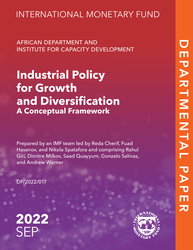
Industrial Policy for Growth and Diversification: A Conceptual Framework
This departmental paper presents a conceptual framework to analyze industrial policy, defined as targeted sectoral interventions.
READ MORE...
Volume/Issue:
Volume 2022
Issue 017
Publication date: September 2022
ISBN: 9798400214271
$20.00
Add to Cart by clicking price of the language and format you'd like to purchase
Available Languages and Formats
| English |
Topics covered in this book
This title contains information about the following subjects.
Click on a subject if you would like to see other titles with the same subjects.
Exports and Imports , Economics- Macroeconomics , Taxation - General , International - Economics , Public Policy , Industrial Policy , Diversification , Economic Development , IMF team , Policy tool , policy failure , IMF Library , diversification strategy , Infrastructure , Tax incentives , Exports , East Asia , Global
Summary
As countries strive for a strong recovery and to recoup the losses incurred during the COVID-19 pandemic, they need to map out a new path for development and high and sustained growth. Promoting diversification, developing new industrial capabilities, and designing the policies needed to achieve this goal should be a priority. A successful diversification strategy should tackle both broad policy failures, such as an unfavorable business environment and investment climate and sector-specific market failures. This departmental paper presents a conceptual framework to analyze industrial policy, defined as targeted sectoral interventions. The authors first discuss the key principles that should guide policymakers, that is, a focus on the market failures that could justify targeted sectoral interventions, as well as the potential government failures that can undermine these interventions. The authors then discuss some commonly employed policy tools, their rationale, and the associated pitfalls. Finally, the authors outline a stylized decision-making framework.
Copyright © 2010 - 2026
Powered by:
AIDC



